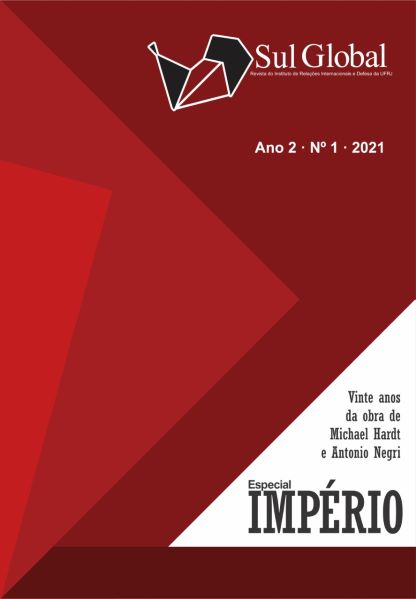On the Commodification of Living Knowledge in Empire: A View From the Global North
Palabras clave:
Empire, contemporary capitalism, Michael Hardt, Antonio NegriResumen
This essay discusses the hypothesis of ‘the commodification of living knowledge’. This hypothesis sheds light on contemporary capitalism’s attempt to capture knowledge produced by living labour within the institutions of the welfare state in its process of valorisation, which provides another perspective on how ‘the welfare state’ transforms into ‘the competitive state’. This discussion situates itself within the post-workerist literature, especially referring to twenty-year-old publication of the literat Michael Hardt and philosopher Antonio Negri’s magnum opus Empire (2000). Focusing on the Nordic welfare state, the aim of the essay is to show how capital attempts to commodify living knowledge produced this setting. This is particularly exemplified through the phenomenon of ‘welfare export’ reflecting how the common is commodified. Through the discussion of how the Nordic welfare state is re-configured, the essay concludes by locating a new site of political struggle, as phenomenon such as ‘welfare export’ forces us to critically reflect on the purpose of welfare and the role of the welfare state as such in Empire.
Descargas
Citas
Bibliography
Agustín, Óscar García. 2013. ‘The Art of Non-Playing Chess: The Institutionalization of the Common’. In Post-Crisis Perspectives: The Common and Its Powers, eds. Óscar García Agustín and Christian Ydesen. Frankfurt am Main: Peter Lang, 205–26.
Andersen, Magnus. 2020. ‘Commodifying the Nordic Welfare State in the Age of Cognitive Capitalism: The Journey of Nordic Childcare Know-How to China’. PhD Dissertation (forthcoming). Aalborg University.
Brophy, Enda. 2015. ‘Materializing Immaterial Labour’. In Due to Injuries, eds. Jamie Hilder and Brady Cranfield. Vancouver: 221A and Publication Studio, 53–63.
Carls, Kristin. 2007. ‘Affective Labour in Milanese Large Scale Retailing: Labour Control and Employees’ Coping Strategies’. Ephemera 7(1): 46–59.
Cerny, Philip G. 1997. ‘Paradoxes of the Competition State: The Dynamics of Political Globalization’. Government and Opposition 32(2): 251–74.
Dowling, Emma. 2007. ‘Producing the Dining Experience: Measure, Subjectivity and the Affective Worker’. Ephemera 7(1): 117–32.
Fumagalli, Andrea. 2013. ‘Cognitive Biocapitalism, the Precarity Trap, and Basic Income: Post-Crisis Perspectives’. In Post-Crisis Perspectives: The Common and Its Powers, eds. Óscar García Agustín and Christian Ydesen. Frankfurt am Main: Peter Lang.
Fumagalli, Andrea, Alfonso Giuliani, Stefano Lucarelli, and Carlo Vercellone. 2019. Cognitive Capitalism, Welfare and Labour: The Commonfare Hypothesis. London: Routledge.
Gill, Rosalind, and Andy Pratt. 2008. ‘In the Social Factory?: Immaterial Labour, Precariousness and Cultural Work’. Theory, Culture & Society 25(7–8): 1–30.
Hardt, Michael, and Antonio Negri. 2000. Empire. Cambridge, Mass: Harvard University Press.
———. 2004. Multitude. London: Hamish Hamilton.
———. 2009. Commonwealth. Cumberland: Belknap Press.
———. 2017. Assembly. New York: Oxford University Press.
———. 2019. ‘Empire, Twenty Years On’. New Left Review 120: 67–92.
Lazzarato, Maurizio. 2012. The Making of the Indebted Man. Los Angeles: Semiotext(e).
Marazzi, Christian. 2011. The Violence of Financial Capitalism. Los Angeles: Semiotext(e).
Marx, Karl. 1973. Grundrisse. London: Penguin Books.
Mezzadra, Sandro, and Brett Neilson. 2014. ‘The State of Capitalist Globalization’. Viewpoint Magazine 4.
———. 2015. ‘Operations of Capital’. South Atlantic Quarterly 114(1): 1–9.
———. 2017. ‘On the Multiple Frontiers of Extraction: Excavating Contemporary Capitalism’. Cultural Studies 31(2–3): 185–204.
———. 2019. The Politics of Operations. Durham: Duke University Press.
Raunig, Gerald. 2013. Factories of Knowledge, Industries of Creativity. Los Angeles: Semiotext(e).
Roggero, Gigi. 2010. ‘Five Theses on the Common’. Rethinking Marxism 22(3): 357–73.
———. 2011. The Production of Living Knowledge: The Crisis of the University and the Transformation of Labor in Europe and North America. Philadelphia: Temple University Press.
Schmidt, Jakob Bang. 2014. ‘Velfærd Kan Blive Det Nye Bacon’. Ugebrevet A4.
The Council of Innovation. 2004. Den Danske Strategi - Danmarks Muligheder i Det Globale Videnssamfund.
Toscano, Alberto. 2007. ‘From Pin Factories to Gold Farmers: Editorial Introduction to a Research Stream on Cognitive Capitalism, Immaterial Labour, and the General Intellect’. Historical Materialism 15(1): 3–11.
Tronti, Mario. 2019. Workers and Capital. London: Verso.
Vercellone, Carlo. 2007. ‘From Formal Subsumption to General Intellect: Elements for a Marxist Reading of the Thesis of Cognitive Capitalism’. Historical Materialism 15(1): 13–36.
———. 2010. ‘The Crisis of the Law of Value and the Becoming-Rent to Profit’. In Crisis in the Global Economy: Financial Markets, Social Struggles, and New Political Scenarios, eds. Andrea Fumagalli and Sandro Mezzadra. Los Angeles, CA: Semiotext(e), 85–118.
Wissinger, Elizabeth. 2007. ‘Modelling a Way of Life: Immaterial and Affective Labour in the Fashion Modelling Industry’. Ephemera 7(1): 250–69.
Woodcock, Jamie. 2017. Working the Phones: Control and Resistance in Call Centres. London: Pluto Press.


